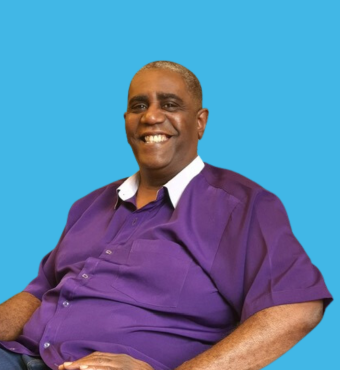
Prostate Cancer is the most common cancer in men, with 1 in 8 men across the UK diagnosed in their lifetime. For Black men the risk doubles to 1 in 4.*
Paul, 62, took part in the PROTEUS Prostate Cancer research study run by North Bristol NHS Trust. He tells us how he came to be diagnosed with prostate cancer, despite not having any symptoms, and the part his friends have played in his health and research journey.
After my best friend was diagnosed with Prostate Cancer I decided it was time to get checked out
As a black man approaching 50 years old I understood how prevalent Prostate Cancer was among the black community. So I accompanied another (rather nervous) friend to the GP surgery where we requested a test. I thought it might be a more intrusive test, but it was just a blood test.
I didn’t have any symptoms
But they found a tiny bit of blood in my urine which they needed to investigate further. So, I had 12 biopsy samples taken and they discovered a small amount of cancer in one of them. In 2013, I was officially diagnosed and chose “active surveillance” as my treatment. This meant I had blood tests every six months. My PSA (prostate-specific antigen) levels at the time were relatively low, around three or four.
After about six/seven years my PSA started to increase
I still had no symptoms. After a meeting with my Consultant I had to decide on a new treatment decision as my cancer have become particularly aggressive. My main options were radiotherapy, or surgery to remove the prostate gland and tissues surrounding it, known as a radical prostatectomy.
Video Transcript
Paul’s Story - Video Transcript
Hi, I'm Paul. I own a small property letting company specialising in helping people who've got houses of multiple occupation.
When were you first diagnosed with Prostate Cancer?
In 2013 it was that I was originally diagnosed. And then I had to have tests every six months. Just a blood test once every six months. My PSA at the time was something like about three or four. It was really quite low. And so I just went along like that really quietly. And probably about six, seven years later, I got to the stage where again, I still had no symptoms whatsoever, but my PSA started to increase.
How did you hear about the study?
The guy that was best man at my wedding, the guy I had known nearly 40 years. Strangely, he was diagnosed with Prostate Cancer as well. He decided to go on to the PROTEUS study, and I didn't know what that was. And he told me all about it and how he was attracted to do it because, he felt it was an opportunity to help others. And I was there giving him all this support, saying how it’s wonderful what you're doing. You're so brave. All of this stuff. Not realising that just around the corner, it was going to be my turn.
Why did you decide to take part?
For me, I was attracted to the PROTEUS study because I again wanted to help other people. I thought it’s untested and my prostate’s got to go anyway. And if the research information they get from me helps other people, then hip hip hooray. You know, because Prostate Cancer isn't going away.
Any advice to people thinking about taking part in research?
I would say give it a try. Try it and see what you think. Don't just turn your back on it because you could be turning your back on something that's really going to help you. Because without my friend there to be able to speak to initially, I probably would have turned my back on it as well. And I would have been far worse off because of it.
I decided to join the PROTEUS study as part of my treatment plan
I first heard about it from my friend of nearly 40 years who was best man at my wedding. He was part of the study long before it was relevant to me and he told me all about it and how he was attracted to do it because he felt it was an opportunity to help others. I was there giving him all this support, saying how it’s wonderful what you're doing. You're so brave. Not realising that just around the corner, it was going to be my turn.
The PROTEUS study tested an investigational drug in patients with high-risk, localised or locally advanced prostate cancer who were candidates for radical prostatectomy. Whilst the surgery is a common treatment for these patients, it doesn’t always stop disease progression. As a result, researchers recognised the need to prevent reoccurrence of cancer, even after the prostate is removed.
I was attracted to the PROTEUS study because I wanted to help others like my friend had
I thought it’s untested and my prostate’s got to go anyway. And if the research information they get from me helps other people, then hip-hip hooray. Because Prostate Cancer isn't going away.
For anyone thinking about taking part in research
I would say try it and see what you think. Don't just turn your back on it because you could be turning your back on something that's really going to help you. Because without my friend there to be able to speak to initially, I probably would have turned my back on it as well. And I could have been far worse off because of it.
The study may or may not benefit me
I won’t know if the treatment I received as part of the research study has given me a longer life expectancy until further down the line – and I won’t know if I received a placebo or the treatment. But it feels good doing something positive and potentially helping others in my community and beyond as well.
*(Source: Prostate Cancer UK).
